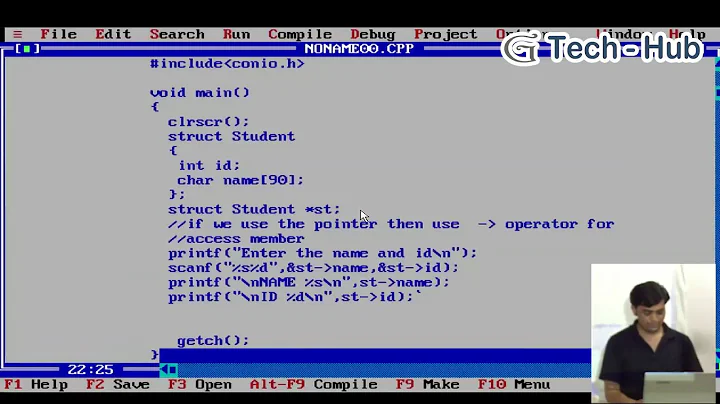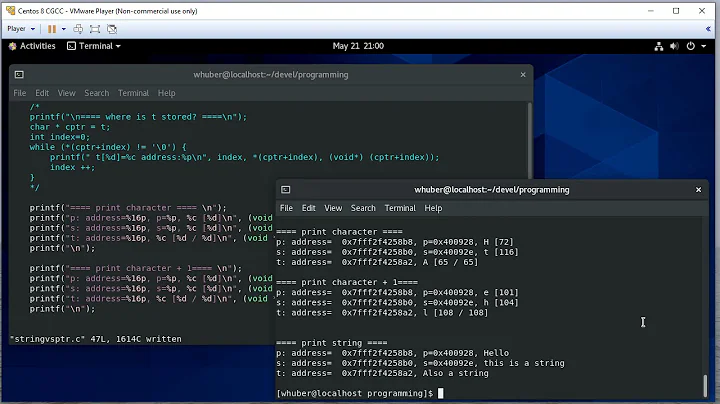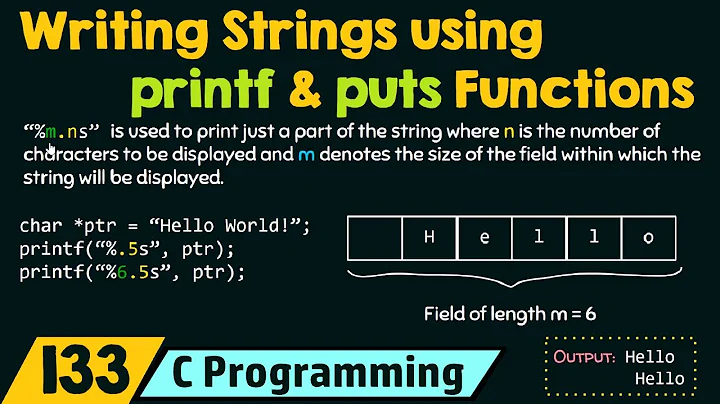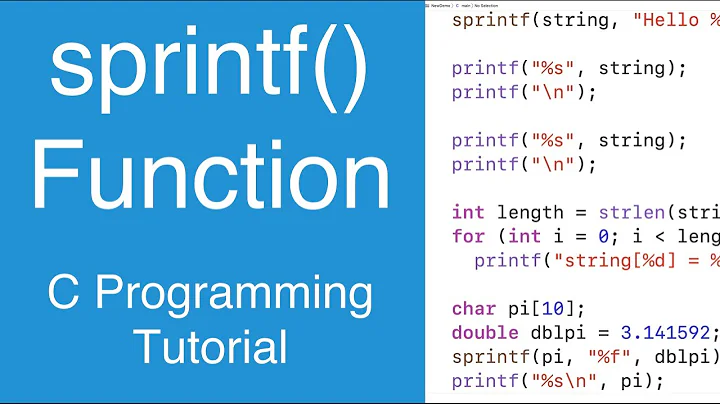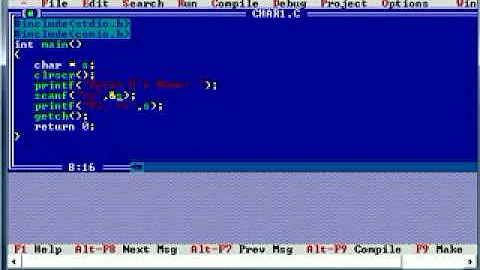Can a pointer to a string be used in a printf?
Solution 1
The "%s" format specifier for printf always expects a char* argument.
Given:
char s[] = "hello";
char *p = "world";
printf("%s, %s\n", s, p);
it looks like you're passing an array for the first %s and a pointer for the second, but in fact you're (correctly) passing pointers for both.
In C, any expression of array type is implicitly converted to a pointer to the array's first element unless it's in one of the following three contexts:
- It's an argument to the unary "&" (address-of) operator
- It's an argument to the unary "sizeof" operator
- It's a string literal in an initializer used to initialize an array object.
(I think C++ has one or two other exceptions.)
The implementation of printf() sees the "%s", assumes that the corresponding argument is a pointer to char, and uses that pointer to traverse the string and print it.
Section 6 of the comp.lang.c FAQ has an excellent discussion of this.
Solution 2
printf("%s\n", ptr);
Is this what you want?
By the way, from printf(3), here's the documentation for the s conversion specifier (i.e %s):
If no l modifier is present: The const char * argument is expected to be a pointer to an array of character type (pointer to a string). Characters from the array are written up to (but not including) a terminating null byte ('\0'); if a precision is specified, no more than the number specified are written. If a precision is given, no null byte need be present; if the precision is not specified, or is greater than the size of the array, the array must contain a terminating null byte.
Solution 3
you should do "printf("S: %s\nPTR: %s\n", s, ptr); " instead of printf("S: %s\nPTR: %s\n", s, *ptr);
difference between ptr and *ptr is: ptr gives you the address in the memory of the variable you are pointing to and *ptr gives rather the value of the pointed variable In this case is *ptr = ptr[0]
this code will show what i mean:
printf("\tS: %s\n\tPTR: %s\n\tAddress of the pointed Value: %x\n\tValue of the whole String: %s\n\tValue of the first character of the String: %c\n", s, ptr,ptr,ptr,*ptr);
Related videos on Youtube
andreihondrari
I'm a freelance full-stack software engineer. I've been coding for quite a while and I enjoy helping others out! Feel free to email me for anything at: [email protected].
Updated on March 09, 2020Comments
-
andreihondrari about 4 years
I am thinking of something like:
#include <stdio.h> #include <conio.h> #include <stdlib.h> int main(void) { //test pointer to string char s[50]; char *ptr=s; printf("\nEnter string (s): "); fgets(s, 50, stdin); printf("S: %s\nPTR: %s\n", s, *ptr); system("PAUSE"); return 0; }Or should I use a for loop with *(s+i) and the format specifier %c? Is that the only possible way to print a string through a pointer and a simple printf?
Update: The printf operates with the adress of the first element of the array so when I use *ptr I actually operate with the first element and not it's adress. Thanks.
-
Bertrand Marron almost 13 yearsPlease don't use
gets. "Never use gets(). Because it is impossible to tell without knowing the data in advance how many characters gets() will read, and because gets() will continue to store characters past the end of the buffer, it is extremely dangerous to use. It has been used to break computer security. Use fgets() instead." (fgets(3)). -
Jeff Mercado almost 13 yearsIf you don't mind, I tweaked the code to minimize the chance of comments about what you wrote that are not important to the question. Namely using
gets()and the return type ofmain(). You should avoid usinggets()at all costs and use other methods such asfgets()(as @Bertrand explains). Alsomain()should always returnint.
-
-
andreihondrari almost 13 yearswell actually
printf("%s\n", *ptr); -
CB Bailey almost 13 years@AndrewGH: Betrand Marron is correct.
*ptrhas typechar, but%srequires typechar*soprintf("%s\n", ptr);is correct. -
Bertrand Marron almost 13 years@Andrew G.H., No.
ptris a pointer to char.*ptris a char. -
andreihondrari almost 13 yearsI was wondering if I could print that string through a pointer using the %s without any other fuzzle.
-
Bertrand Marron almost 13 years@Andrew G.H., Yes
printf("%s\n", ptr). If you don't understand, I strongly recommend you to read a book about pointers and learn to use them. -
andreihondrari almost 13 yearsWhat I've read is that the folowing identities are true:
array equals &array[0]and*array equals array[0]so basically what i understant that I can assign to a pointer the adress of the first elementptr=array_namethat basically means that the pointer stores the adress of array_name[0], that is&array_name. -
andreihondrari almost 13 yearsSo knowing that, why can't I access the string by *ptr? because *ptr is equivalent to the array[0] ...so I don't understant why use simply
ptr? -
andreihondrari almost 13 yearsYes, of course but, when using
printf("%s", array_name)you basically access &array_name[0], isn't it so?... oh nevermind I got it. the printf operates with the adress of the first element of the array so when I use *ptr I actually operate with the first element and not it's adress. Thanks. -
arthur almost 13 years@Andrew G.H: printf("%s", array_name) doesn't let you access the &array_name[0] but rather &array_name. The &array_name is the address of the variable of the certain type. The way to process each variable differs according to the type. for Strings (char*) the %array_name but to the first characters like you said, but because of the "%s" , printf has to read array_name til '\0' is found
-
andreihondrari almost 13 yearsthe identifier of an array is equal to the adress of the array's first element:
array_identifier == &array_identifier[0]cplusplus.com/doc/tutorial/pointers -
arthur almost 13 yearsyes of course but it' seems you thought printf("%s", array_name) will access the the first element ... i just try to tell you, that because of "%s" the printf will print all the content of the pointer's variable till it finds the '\0' in this pointer's variable....
-
andreihondrari almost 13 yearsdoesen't it uses the adress of the first element to do that? I mean every function that I've heard about uses this first adress to determine the rest, because the next elements are consecutively from this point. Any function that uses this system are susceptible to continue counting the elements if no nul byte is found, and that is how buffer overflow occurs. That is why gets is dangerous and can create a B.O.
-
andreihondrari almost 13 yearsIn the pointers and arrays section, in the link I posted before there is a statement: "In fact, the identifier of an array is equivalent to the address of its first element...".
-
arthur almost 13 yearsof course it does that, it uses the adress of the first element to do that.... but i was taking about printf with the "%s" format, which reads the pointer to the end of the last char ...
-
Keith Thompson almost 13 years@Andrew:
*ptris only the first character of the string, not the entire string. Most operations that act on strings do so indirectly, via a pointer to the string's first character. If you pass*ptrto a function, the only information that function receives is the value of that first character; it gives the function no way to access the rest of the string. Passing*ptrlets the function access the first character by dereferencing the pointer, the second character by incrementing the pointer and then dereferencing it, and so on. -
 RBT over 7 yearsregarding
RBT over 7 yearsregardingany expression of array type is implicitly converted to a pointer to the array's first element- Although that is true but memory wise program will allocate 4 or 8 bytes (platform dependent) forpvariable to store address ofwcharacter but that's not the case withsvariable.sis able to behave as pointer just because of the compiler trick as compiler knows that an array is always present in contiguous memory blocks. No separate memory allocation happens forsvariable which stores the address ofhcharacter. Kindly correct me if I've got any of the bits wrong. -
Keith Thompson over 7 yearsI wouldn't say that
s"is able to behave as [a] pointer".sis an array object. The expressionsis, in most contexts a pointer expression. Forchar *p = "world";,sizeof (char*)bytes are allocated forp, and 6 bytes are allocated for array object corresponding to the string literal. You're right that no separate memory allocation is done fors; the declarationchar s[] = "hello";does not create a pointer object. -
 RBT over 7 yearswhy I said that "s is able to behave as [a] pointer" is because
RBT over 7 yearswhy I said that "s is able to behave as [a] pointer" is becauseThe "%s" format specifier for printf always expects a char* argumentandsbeing an array object still suffices expectations of the argument :). But I got your point. We shouldn't callsa pointer when it is actually an array object. -
Keith Thompson over 7 years@RBT: Think of "array" and "pointer" as adjectives, not as nouns. An array expression can become a pointer expression (the "conversion", which should probably be called an "adjustment", happens at compile time). An array object never becomes a pointer object.
